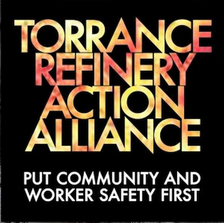
By Carol Moeller and Jane Affonso —
As a reminder eight years ago there was a huge explosion at what was then the ExxonMobil Refinery in Torrance. The blast was so strong it registered as a small earthquake, injured four workers, and came very close to rupturing tanks storing thousands of pounds of toxic modified hydrofluoric acid (MHF), the release of which could have had a catastrophic effect on the entire South Bay. The Torrance Refinery Action Alliance (TRAA) marked the 8th anniversary of the explosion with an informative and well-attended symposium on Feb. 17th at Cal State Dominguez Hills and by Zoom. TRAA thanks PV Dems for publicizing the event.
Shortly after the explosion ExxonMobil washed its hands of the many issues at the refinery and sold it at a discount to PBF Energy. Two years later, a report by the US Chemical Safety Board (CSB) put the blame on ExxonMobil. “The CSB found that this incident occurred due to gaps in the refinery’s process safety management system” and represented a “near miss” of a catastrophic release of MHF.
A series of speakers emphasized that HF is just too inherently dangerous to be mitigated and that refineries should be required to convert to one of several safer, available and economically viable alternatives. Only two refineries in California (Valero in Wilmington and PBF Energy in Torrance) use a modified form of HF, but studies show that the modification does little to reduce the danger. Our local Air Quality Management District (AQMD) warned that a “release of MHF will result in exposure to HF with the same health effects.” Other refineries around the country have successfully transitioned to a safer alkylating substance, and that is what TRAA is asking for.
Rep. Nanette Diaz Barragán who represents Wilmington, attended in person and stated “We need to continue to highlight the dangers of modified hydrofluoric acid — we know that (it) is deadly, we know it’s toxic and corrosive. I wanted to be here today because I wanted to make sure that you knew that I stand with you and I’m going to advocate until we make the community safer and until we phase out HF.”
Rep. Maxine Waters representing Torrance congratulated TRAA on its determination by Zoom: “Your persistence has brought attention to the extreme dangers of this chemical and forced the refineries to consider alternatives — and forced the EPA (Environmental Protection Agency) to consider phasing out MHF and preventing a devastating mass casualty event.” Other speakers included representatives from County Supervisor Janice Hahn’s office, Assemblymember Al Muratsuchi’s office, SEIU, Coalition for Clean Air and numerous other community groups.
Dr. George Harpole shared an impressive slideshow of the terrifying consequences of a worst-case HF release in Torrance and the viability of various alternatives which can be found on the TRAA Blog.
TRAA has recently focused its advocacy on the U.S. EPA, which is currently in the process of reviewing public comments regarding its proposed Risk Management Program Safer Communities by Chemical Accident Prevention. That Proposed Rule, if passed, “is expected to make communities safer by reducing the frequency of chemical releases and their adverse effects,” according to the EPA’s website. However, TRAA and its partners do not feel this EPA Proposed Rule goes far enough and should require an analysis of alternatives and a required conversion – citing concerns about MHF use in Torrance and Wilmington specifically.
TRAA is asking people to download, personalize and either email or mail a letter to President Biden, who himself lives near an HF refinery, urging him to require conversion to a safer alternative. Here’s a link : Letter to Biden . To view a recording of the event here is a link: video recording. Use passcode uQa+y4xi to access.

Leave a Reply